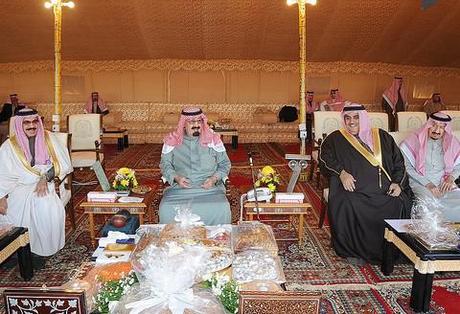
King Abdullah of Saudi Arabia (centre) Photocredit: Bahrain Ministry of Foreign Affairs http://www.flickr.com/photos/bahraindiplomatic/4207300774/sizes/m/in/photostream/
Could the tide of conservatism be turning in Saudia Arabia? Or is everything that’s going on just a front to keep Westerners happy? Octogenerian King Abdullah, who reigns over the country where strict Islamic laws (of the Wahhabi school of Sunni Islam) are enforced, just days ago promised that women would be able to vote in the forthcoming 2015 municipal elections, and that women will be appointed to the hitherto all-male council, the Shura. (They won’t be voting in local elections this week – but then, these are only the second elections to be held in the country – voting was introduced in 2005).
Abdullah’s decision was warmly welcomed by women’s rights campaigners in the country, who have been actively setting out to challenge the severe restrictions. Saudi women are not allowed to drive (though the convention is not enshrined in law, it is by custom) as it is thought that freedom of movement encourages sin. This applies to foreigners in the country as well as local women.
So when Shaima Jastaina was found guilty of driving a car and sentenced to ten lashes, campaigners were horrified. Not for long, though, as the King (seen as a reformer in his country) intervened personally to overturn the sentence. Neither the King nor his spokesman were available for comment.
“Thank God, the lashing of Shaima is cancelled. Thanks to our beloved King. I’m sure all Saudi women will be so happy, I know I am,” tweeted Saudi Princess Ameerah Al-Taweel. She also tweeted Shaima Jastaina’s reaction: “the King’s orders washed the fears I lived with after this unjust sentence.”
Women will find their voices. There is much support for “managed change” in Saudi Arabia, said Claire Spencer in The Daily Telegraph. The people don’t take to the streets in revolutionary masses – instead they address petitions respectfully to the King. His legitimacy is entwined with Wahhabi Islam; it’s not that women want out of Shariah law completely – they want it reinterpreted to face the modern world. Abdullah has been a champion of female education, which has resulted in a more questioning populace. Giving them the vote, however, won’t do that much – local elections have very limited effect on government. It’s still an authoritarian state. Whereas direct revolution is unlikely, the young population will mean that “discontent will increase.” The succession of Abdullah is a complex issue – and it’s in deciding how their country will be run, not through the ballot box, that women will find their voices in the debates to come.
“The next election could be delayed like the current one, or the decree could be annulled at the king’s whim at any time. Despite a few democratic trappings, Saudi Arabia is still a hard-line Islamic autocracy where women have to bow, fully covered, to ‘the will of Allah’” said an editorial in The Washington Times.
The view from within. A piece on The Saudi Gazette, headlined “Ecstatic women say ready for public role” quoted Huda Al-Jeraisy, a businesswoman, who said it would “be a challenge for Saudi women to take responsibility by being part of opinion-making at the Shoura Council and exercise voting rights judiciously by choosing the right candidates whether male or a female.” The piece also quoted Asmaa Al-Hamad, a PR consultant, who said that “we want nothing more” than being able to drive.
Still more is needed. An editorial in The Washington Post said that these moves weren’t enough. Saudi Arabia has been a terribly oppressive force in the Arab Spring – it backed Egypt’s Hosni Mubarak and even sent troops to Bahrain to help put down the uprising. It’s also been bribing its people to avoid further reform. This announcement that women will get the vote may be “simply another palliative”. US President Barack Obama’s administration needs to get in there and demand more.
Driving change. I agree, said Susan Jacoby in her Sprited Atheist blog on The Washington Post. This decision to overturn the “violent, medieval, religiously driven (you should excuse the expression)” penalty is just how the Saudis mollify “international opinion”. And anyway, women will only be able to vote if their male relatives give permission. Jacoby is “disgusted” by praise for Abdullah, a “theocrat” who cares more about his country’s public image than about actual women’s rights.

